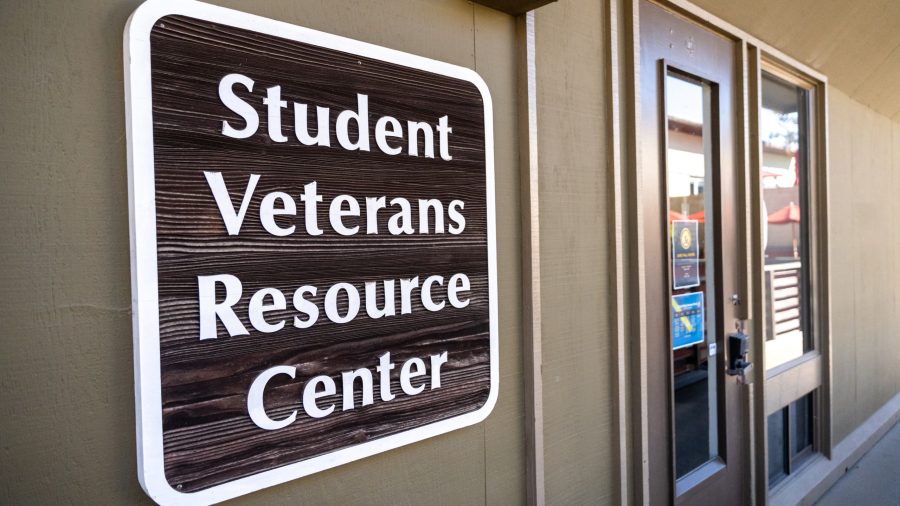Peer Navigator at the Student Veteran Resource Center and senior Stephen Vaughan says he has found a home and community at UC San Diego and the SVRC, albeit through a non-traditional journey. After serving in the Navy for four years, he left at the end of 2018 and attended community college in Los Angeles for the next two years. Vaughan notes that the Post-9/11 GI Bill was helpful; his tuition is covered, and he receives some direct deposit money for rent.
Vaughan transferred to UCSD last fall quarter and recalls there were still a lot of COVID-19 restrictions in place, especially in campus centers like the SVRC. Vaughan was therefore not involved with the SVRC during his first few quarters here, until his friend—a fellow veteran he had met in class—brought him there.
“He was going to get coffee, and it turned out to be a busy day. There were other students [at the SVRC], and I hadn’t even been in here before, so that was intriguing,” Vaughan told The UCSD Guardian. “It’s nice, you know, having our own area to study. Once I started coming in, I pretty much didn’t stop.”’
Vaughan became a regular at SVRC (a subdivision of the UCSD’s Student Success Programs), and when he was approached by the program manager at the time to apply for a job there, he took him up on the offer. Vaughan notes that students working at the SVRC do so through the Veterans Affairs (VA) work-study program.

“There’s an immediate connection [at the SVRC], especially among the veterans,” Vaughan said. “So the conversations just kind of flow a little easier, and a lot of us here are a little bit older than some of the other [students] and have had different journeys getting here to this university, and so I think that commonality makes people more comfortable with each other.”
At the SVRC, Vaughan’s supervisor is Antonio Del Pozo, the Interim Program Specialist. Del Pozo explains that there is one Program Manager and one Program Specialist (him) working at the SVRC along with six student workers, who are all either Center Operations Personnel or Peer Navigators.
The SVRC has an official mission statement, but in Del Pozo’s words, they are a “center which supports, has resources, and acts as a place of transition for not only our service members and veterans, but everybody affiliated with the military — that may be spouses or children of veterans, active duty service members, or people currently in ROTC (Reserve Officers’ Training Corps). And so our center connects our patrons to resources. [The SVRC] is mainly an area where we provide a place for them to gather, study, and help them along with their transition.”
Del Pozo notes that they have partnerships with many different organizations on campus such as Counseling and Psychological Services (CAPS), Office of Students with Disabilities (OSD), and liaisons with the financial aid office and registrar’s office, which handle the processing of federal and state benefits for students.
On a typical day, Vaughan says that regulars come in to get their coffee and study, while others drop by to ask questions about housing, veteran benefits, and more. He usually directs these people to resources that will help them resolve their issues and gives new faces a tour of the center — pointing out the couches and bookshelves, the quiet study area, the meditation (or more aptly named, nap) room, and the counter with snacks and a coffee machine.
The SVRC also does events periodically; for instance, Vaughan mentions that last month, they coordinated with the Triton Transfer Hub to do a 25+ mixer at Dirty Birds.
Vaughan says that, although the pandemic put a stop to many of the activities the SVRC could do, he feels like this quarter they are finally starting to go back to pre-pandemic levels of community and activities.
“We’re getting more and more people coming in,” Vaughan said. “We’re just growing the community, and that takes time, but I think we’re doing a good job of fostering that growth.”
In terms of goals, Del Pozo hopes to continue moving in the direction of being more inclusive and improving visibility and outreach. He wants the SVRC to become more well-known throughout campus and hopes to continue providing opportunities and support for students within the UCSD community, as well as the greater San Diego area.
“Come around the center,” Del Pozo said. “It’s a pretty warm, inviting atmosphere; we’re very accepting of whoever wants to come here. I know [that] sometimes there might be a stigma [around] the veteran identity and it being a non-traditional student identity compared to what some might consider a student experience. At the end of the day – and I’m not trying to speak for them — they’re still students, and they’re excited to be here, to learn, and this is a place of support and acceptance where we try to foster a strong community.”














William Sawyers • Nov 19, 2022 at 4:21 am
Good News! I would to say thank you for supporting Veterans in the University of California San Diego (UCSD) Community. As a student, I often struggle to do my academic assignment that’s why I decided to take my writing help from Edubirdie. So anyone can tell me that is edubirdie legit or trusted platform for students’ academic writing solutions. Did any students take their academic writing services before? Anyway, I really appreciated the authority for taking this good initiative. Thank you author for sharing this valuable news with us.
Sara • Nov 14, 2022 at 12:04 am
Do Work At your Home And Make Money From Home .,..
Open This Link …>http://www.richsalaries4u.blogspot.com/